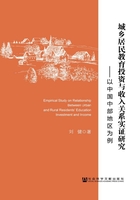
ABSTRACT
The rise of modern human capital theory in the 1960s and the rise of new growth theory in the 1980s regard human capital as one endogenous factors of the national income growth and social progress promotion,one of the most important way of human capital formation is to accept education,so the education investment and the formation of education human capital in the economic and social development is particularly important.
On the basis of comprehensive domestic and foreign related literature,this paper focuses on the education investment to promote urban and rural residents income growth differences with the income of urban and rural residents,urban and rural education investment,education promote the labor transfer of human capital increases the rural residents income three aspects make the theory discussion and to make an empirical analysis of the six provinces in central.
In the aspect of education investment to promote urban and rural residents income growth. The paper think that investments in education can improve the workforce’s value,education in the labor market can help educatees to apply for a job of some kind of signal,education itself to promote the social stratification and the income gap,education will enhance the comprehensive qualities of workers and so on,promote the educatees revenue growth. Empirical analysis in China and the central six provinces from 1995 to 2011,urban and rural residents per capita education investment on per capita income growth,the relationship between the empirical results show that the per capita education investment changes significantly affect income,increased investment in education is a significant way to improve people’s income. Both the individual effect from six provinces in central and the six provinces in central as a whole view of the overall effect,the empirical results show that between education investment to urban and rural residents and the residents’ income growth has significant cointegration relationship. And use error correction model to describe the education income stability of the system (i.e.,due to external factors make residents income after the divergence of income back to determined by the education investment to long-term equilibrium values reflect speed) are very strong,in addition to the Hubei province is more than 50%. By establishing a virtual variable model of the empirical results indicate that the central plays a significant role in the role of the residents’ increasing education investment and income of urban and rural differences,where urban education investment on education investment and rural residents income growth promoting effect on revenue growth promoting effect of significantly different.
In the aspect of education differences between urban and rural residents and the income disparities. Firstly analyzes the affect the mechanism of income differences,education differences into urbanization coefficient of individual differences in the six provinces in central for control variable model and panel data,the overall effect of the empirical results show that residents of urban and rural differences and education investment income difference between urban and rural areas was significantly positively correlated relationship,indicating that narrowing the difference of education investment in urban and rural residents is an effective way of narrowing the income gap between urban and rural areas.
In the education of human capital improve labor resources configuration to increase social welfare. First theoretical analysis of the education of human capital promotion can effectively promote the rural labor force transferring to towns is engaged in the industry with higher income,which increases non-agricultural income of rural residents. Empirical analysis and normative analysis result is consistent,the central region employment education of human capital promotion can effectively improve the labor resources configuration to increase on the basis of theoretical analysis and empirical analysis concluded on education balanced development is to build a well-off society in an all-round way to narrow the income gap between urban and rural areas of effective measures,in the rural education vigorously to increase education spending,to ensure steady development of narrow the gap between urban and rural education,puts forward the rely on science to promote labor transfer three aspects education balanced development policy Suggestions to promote the balanced development of the society.
Obtained based on the theoretical analysis and empirical analysis on education balanced development is to build a well-off society in an all-round way to narrow the income gap between urban and rural areas of effective measures,in rural education vigorously to increase education spending,to ensure steady development of narrow the gap between urban and rural education,puts forward the rely on science to promote labor transfer three aspects education balanced development policy Suggestions to promote the balanced development of the society.
Keywords:Education Human Capital;Education Investment;Income Disparity Between Urban and Rural Areas;Labor Transfer